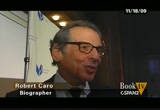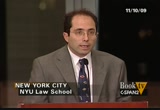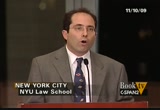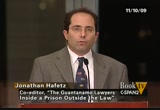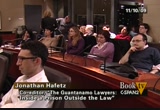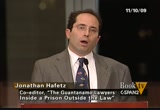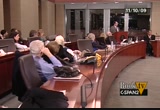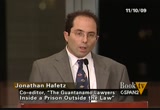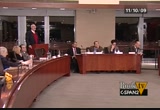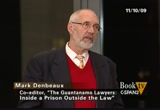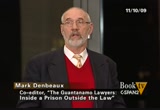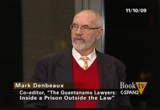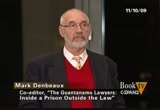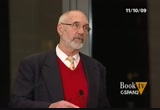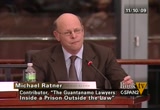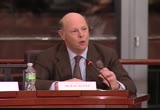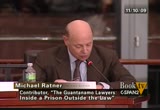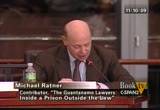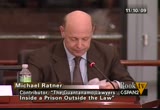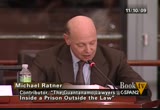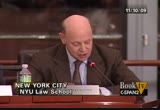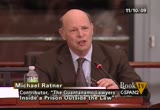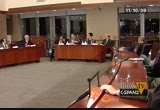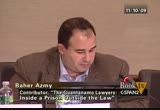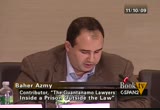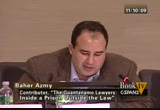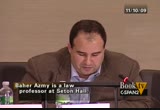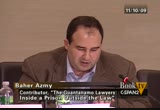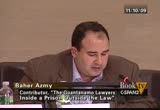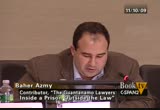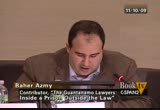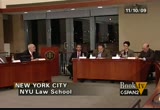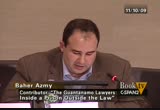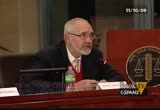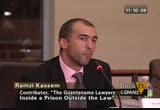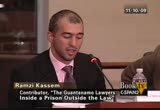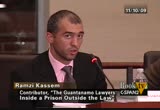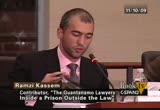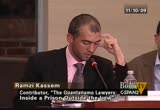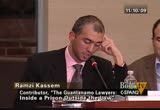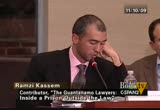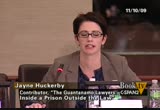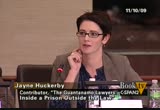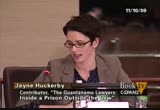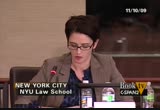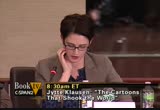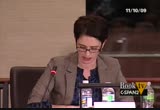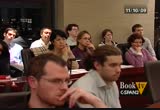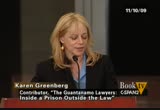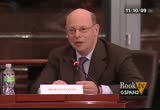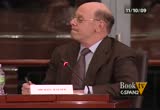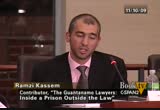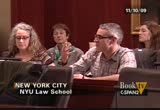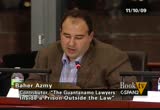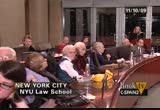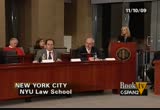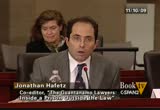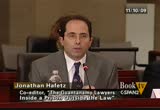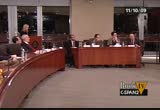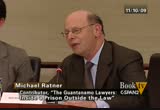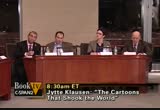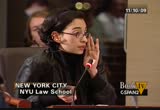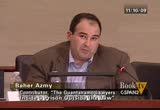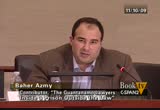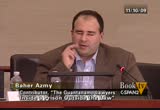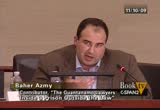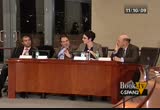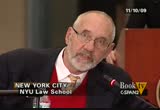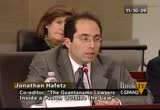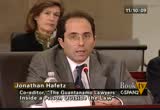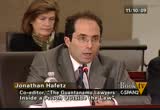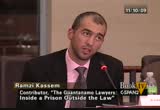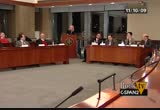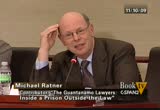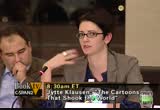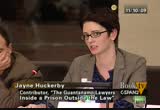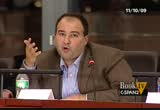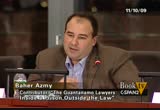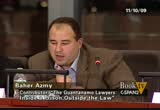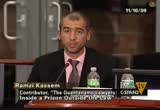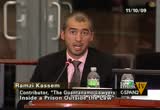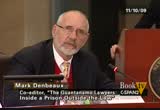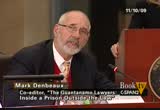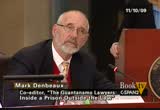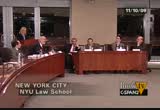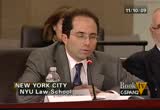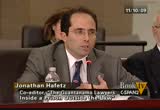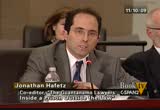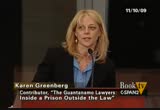tv Book TV CSPAN January 10, 2010 7:00am-8:30am EST
7:00 am
>> author robert carol, what are you reading? >> i'm reading right now, re-reading a, the prime minister by anthony patrolop. he wrote six political novels about the -- england in the 1870s. wonderful political -- understanding of how human beings in politics, how human nature influences politics. >> why are you re-reading those? >> i just think he's got such -- well, first, his sentences are great. his paragraphs are great. you say, boy, how did he do this so i'm always looking to see how he did it. but even more than that, i write about how human nature -- i try to write about how human beings and presidents and cabinet ministers are affected by being in politics and how their human nature affects political decision. and he's really doing the same thing in a fictional way. and so i try to learn from him.
7:01 am
>> the book, "the guantanamo lawyers" is a collection of stories about the detainees and their experiences as told by new york university law school hosts the 90-minute event. >> in thinking about this book and how we brought it about, the question really was, how do you depict and how do you capture a prison beyond the law? because that's what guantanamo was. guantanamo was created by the bush administration in late 2001 to create a place where individuals could be detained without any kind of legal protection outside the constitution, outside the geneva convention, outside the law and outside of habeas corpus, the ability to challenge your detention in court. that's been with us since the nation's founding. many of you are, i'm sure,
7:02 am
familiar with what's gone on at guantanamo. the arbitrary detention, the detention of many innocent individuals, the holding of people without trials, torture, abuse, and other violations of human rights that so tarnished this country's reputation. what we wanted to do through the book was to make clear that guantanamo wasn't just about legal battles. but, of course, it was about these landmark legal battles that have been fought that have been brought by the lawyers on behalf of their clients to challenge the prison beyond the law. guantanamo is about more than that, though, it's about the stories and i think the stories is the key here. what we've tried to do through the contribution of more than 100 of the lawyers who have worked on these cases. lawyers from all walks of life, large law firms, small law firms, public interest
7:03 am
organizations, federal defenders offices is to bring to light the stories of the detainees and the stories of the abuses of guantanamo. because in the end it's not only about the legal battles, it's also about changing the narrative, changing the discourse, and changing the understanding about what guantanamo was and why guantanamo was a human rights catastrophe and a disaster for this nation. what we did was we organized these stories and to try to give the reader a depiction of what it was like to represent detainees from the moment you accepted a case to traveling down to the base at guantanamo to dealing with all of the bureaucratic hurdles that you had a to get through to litigating in and out of court, and to finally try and obtain the client's release. and also to give the story -- or
7:04 am
give voice of the story of the detainees. who have been silent for so long initially by and primarily by being held in communicado by more than two years the world didn't know who was held at guantanamo. the names were secret. it was done -- it was a secret prison in effect at this u.s.-run naval base. so we wanted to give voice to the stories of the detainees and the numerous contributions in the book do that. they bring i it out in all of the horror, the suffering, the trials, the torture, the abuse the detainees went but but also the sense of the hope of the enduring human spirit and even the humor that's gone on at guantanamo and the sense of hope that the detainees -- or many of the detainees have been able to maintain. in addition to telling the stories, we want to preserve the stories. guantanamo is not over.
7:05 am
there are more than 200 individuals who are being detained there still without trial, finally getting a chance to fight their cases, though, in court. but guantanamo is also going to be something that's remembered. something that's studied, something that's talked about for generations. and it was very important to mark and me and to our contributors and for all those who have been involved that the truth be made clear, that the truth be preserved. and that we not forget what was done by the united states at guantanamo, holding people in arbitrary detention and subjecting them to abuse for so long and all the lies and distortions that surround the prison. so we want to tell the truth and tell the stories both now and both -- and to preserve those stories for the future. in addition to the book, we have also set up an archive, the
7:06 am
guantanamo bay detention archive in connection with nyu's tenement library and seaton hall law school and the book in a sense is a beginning and through the archive we're going to continue this important process of preserving, preserving the records of guantanamo, preserving the stories so that it will always be there and people will not be able to minimize, distort or alter the truth of what happened during these last eight years at guantanamo. finally, i want to say that in this day and age and especially in the area of counterterrorism, lawyers have been vilified. you have individuals like john uze who used the law for
7:07 am
justifying torture and illegality and you have the story of the evil perpetrated under the cloak of law. what i hope comes here through, though, through the lawyers, who have given so much of their time to the cause and fighting the detentions at exult guantanamo is the possible redemption in overcoming justice. i want to turn it over to my coeditor, mark denbeaux, who will get us going for tonight. >> thank you very much, jonathan. before i begin, i want to thank some other people. this book is here because new york university press was willing to take a chance on something that had periods of time it looked like chaos with
7:08 am
no hope of order and no opportunity to collect and organize. our editor explained to us she'd never seen a place where people would take thousands of pages, edit them, put them into a narrative, work out a narrative structure and fit them together. and that happened not just by jonathan and myself. and one of the two of us, it was more jonathan than me to begin with but we had four law students who are mentioned in the book as coeditors. they spent thousands of hours trying to figure out how to fit one story in with another. if you look at it, you'll find some stories are done in three places. 'cause we didn't want a collection of essays by different people explaining their entire experience starting at the beginning and going through until the end. so what our goal was, was to present guantanamo through the eyes of the lawyers as reporters. and the stories of the detainees
7:09 am
as reported by the only people who were the primary source, the first-person accounts of what they were told and what they saw you. now, the reason we decided to do this actually came about in the conversation that jonathan and i were having a few years ago in which the question was, how would history look at guantanamo? and it dawned on us almost at the same time that it was really likely history would say, well, guantanamo wasn't very good. it was a public relations embarrassment. they had some really bad people there. luckily guantanamo kept the bad people from hurting us. sure, a few people were kept there too long, but justice prevailed and justice triumphed and i think that was very painful for almost any lawyer involved to simply caterize this past and try to cover it over. sometimes it's necessary just to expose what happened. and what we have here is the first beginning. and it's only the beginning. you might want to know that i
7:10 am
don't know if we made that fully clear. the excerpts from the pieces that are organized in this book to tell the story -- the entire pieces, every one of them, which is many times more than the book are part of an electronic archive that's available through the nyu press so anybody who wants to see the entire unedited piece of each person's story can do so. and that was the first step on the goal of making sure the history of guantanamo is accurately and fully reported with all of the pictures there. because the next campaign is to make sure that every document from guantanamo is not destroyed. the aclu, nyu and i think yale and students are now working to put together to keep the government from destroying the records that are there. we have delicate problems with the attorneys getting their notes because there are questions of attorney general/client confidences and
7:11 am
we will preserve this for decades people will be able to look and actually see the notes people took while they're interviewing their detainees page after page over several years and they are quite compelling and quite gripping. it's an interesting thing about the role of the lawyers here. we have lawyers who are incredibly important to the process. who felt that they didn't want this to be the lawyers' stories. while they are proud of the law and the role the law played in developing this, they didn't think the issue was glorifying the lawyers. the issue was how to get the story out and there are some stories that we still do not have people from people who have incredibly important roles just because they didn't want to participate in a way that would seek to glorify the lawyers. it's intended to explain. so people will look at the full range of human beings that are
7:12 am
there and the circumstances that exist. and our feeling was that often in history, events happen and people don't even know they're important at the time. looking back on them, they say oh, that was important. and often the events involved people who were not very verbal and not very literate. you can think of issues in the south in the '60s when there were many people who had many stories and no one knew if they were significant and they are lost. now we know about selma, alabama, from the stories of people who were there and from legal briefs but nobody knows actually of the story of the residents of selma, alabama. our feeling was if we could preserve this starting with this book, then these electronic archives and then moving on to the protection of the rest, we will all know because the one thing the lawyers do know is they knew it's important. they are verbal.
7:13 am
they're literate and articulate and as you're about to see, they can tell very low key but nonetheless important stories. so what we're going to do now is have some of the lawyers who have contributed to the book read the excerpts they've selected and i'm going to start i think with -- i want to make sure i get all the facts right but we're asking michael ratner, the president of the center for constitutional rights, which has been running and organizing and coordinating this entire venture. there's no lawyer working on guantanamo who hasn't been coordinating with the operation of the center. michael, i'll ask you to do the first reading. [inaudible] >> yes, i say. [laughter] >> all right. i've been introduced. i'm michael ratner. i'm president of the center for constitutional rights. and in thinking about the readings as well as what mark said about lawyers, i want to just tell a story about a sociologist who came to the center the other day.
7:14 am
and he was doing a story of lawyers having created a movement in fact. the center's lawyers, myself included we were raised to talk about other movement but in this case i think it's accurate to say that the 6 or 700 lawyers who wound up representing guantanamo detainees really created a movement to close guantanamo and arbitrary detention and the effects are still not in. i've chosen three or four short excerpts with me. mark began with me because the cases really began out of the center of constitutional rights so the first one is november 14th. and the chapter is titled michael ratner guantanamo the nine circle of hell. on november 14th, 2001, i awoke to read in the morning paper that president bush under his authority as commander in chief had issued a military order for
7:15 am
the detention and trial of noncitizens in the war on terrorism. as president of the center for constitutional rights i recall my shock. i remember thinking that there had just been a coup d'etat in the united states. perhaps an exaggerated reaction but a watershed moment for me in a country that i still thought had some semblance of a democracy. that's november 14th. the next excerpt concerns what happened at the center when i and a couple others decided we would represent the first people taken into custody under the military order. unusual work for the center which generally represented people we were in substantial agreement with. the november 13th order pushed ccr into action. it was this document that made us begin the historical fight
7:16 am
for the rights of those who a few months later would be imprisoned at guantanamo. it was not automatic that ccr would take on the cases of those jailed under this order. and it was not immediately clear that those cases -- what those cases would be about. at first most of the focus of ccr, the media and experts was on the draconian ad hoc trial provisions and on the death penalty aspects of the president's order. few of us paid much attention to its indefinite detention smakts we began a discussion representing the first people detained. our office is close to the world trade center. i had actually witnessed the attacks. for months new york was like a massive funeral. we were all fright jeopardy. -- frightened. did we really want to representing those who may have been directly involved? some of us were uncomfortable doing so. others were worried about funding as ccr depends on private donations and
7:17 am
foundations. would it be personally dangerous to represent those accused of the attacks? of course, it was possible that those accused were innocent. but at the time we took the cases we had to make sure our clients were not. it was so contrary to law and such a threat to fundamental liberties we needed to challenge it particularly the habeas corpus. once we decided to challenge the november 13th order we went public with our decision as a means of putting the administration on notice that it's overreaching would not go unchallenged and to encourage those critics who might be more timid to fight back. our next step was to try and round up a legal team for what we saw would be major cases. we found some attorneys from the law firm sherman & sterling. we had difficulties work on the possible case for the reasons i mentioned fear of the public reaction, loss of financial support and the creation of bad precedent. however, by this time, early
7:18 am
december, 2001, we had attracted some lawyers from outside ccr. i do not all their motivations, but the fact that their experience was in the areas of death penalty and habeas corpus litigation is a clue to their interests. the earliest members of the team were joe, a civil rights and death penalty lawyer from minneapolis, clive stafford smith a death penalty lawyer from new orleans, eric friedman and an expert on habeas corpus and me. all of us, more than seven years later, remained deeply involved with these cases. the next excerpt is on the fact that at this point we decided to take the cases but, of course, we had no clients. of course, we had no clients but we did not need to wait long. on december 13th, 2001, it was announced that david hicks, australian was captured in afghanistan by the northern alliance and turned over to the united states. a few days later, it was revealed that the united states would be using guantanamo as its
7:19 am
offshore prison where presumably hicks would be sent where he could remain forever without any court hear or access to a lawyer. he was detained solely because the president thought he should be detainted. -- dedetained. i found the lawyer of the lawyer for hick' father as david hicks could have no fact with family or lawyers. i called him immediately. we discussed the representation of david hicks and after a week or so it was agreed. ccr and the lawyers we were working with would file a petition for a writ of habeas corpus on david hicks' behalf. david hicks would not know about our law enforcement lawsuit. -- lawsuit. we would file the habeas case hicks' next friend provision in u.s. law that allows close relatives or others to act on behalf of those who cannot act themselves.
7:20 am
traditionally this device had been used only for people who were mentally incompetent or physically incapacitated. here it was used because the prisoners were being used in communicado. the next excerpt is when i talked briefly what i called guantanamo one. i was quite shocked that the united states was planning to use guantanamo as its offshore prison again. i say again because i had been one of the attorneys who had worked on an earlier guantanamo case. when the administration of george h.w. bush and bill clinton had used the military base as an offshore refugee camp for haitians who were entitled to asylum in the united states but who were prohibited from entering the country because they were hiv positive. i had learned the important lessons -- i learned important lessons from that litigation. first i learned that guantanamo was a really bad place to be imprisoned. i compared the refugee camp to dante's ninth circle of hell with extreme heat, scorpions and
7:21 am
extreme beatings. the two prior administrations had argued and somewhat successfully that exult was a law-free zone and was not protected by the constitution and no one could protect their rights. within a couple of weeks we realized that the chances for getting relief in u.s. courts were going to be difficult and take many years. so we filed with the inter-american commission on human rights within two or three weeks of representing david hicks and others. by march of 2002, the inter-american commissioned come down with an order that is still relevant today. the commission stated a competent court or tribunal as opposed to to a political authority must be charged with ensuring respect for the legal status and rights of persons falling under the authority and
7:22 am
control of a state. to the contrary, the information available suggested that the detainees remain entirely at the unfettered discretion of the united states government. on this basis, the commission hereby requests that the united states take the urgent measures necessary to have the legal status of the detainees at guantanamo bay determined by a competent tribunal. we're still in that process some eight years later. thank you. [inaudible] >> i represented of a german national, turkish ancestry who at age 19 was picked up riding a civilian bus in pakistan by pakistani police, turned over to
7:23 am
u.s. military authorities for what we later learned was a $5,000 bounty and that's what began his ordeal which ended finally on august 24th, 2006, when he was released. in the end ultimately for like so many of the detainees simply being at the wrong place at the wrong time. so i'm going to read sort of two excerpts one about my first meeting with him and then about the day of his relief. the first is entitled shipwrecked. i first saw him on a tv screen. before my initial meeting with him in 2004, u.s. military police escorted me. the third civil war lawyer to enter the inner sack item of camp echo through several 15-foot high locked feats and into the guard booth in the world's most notorious prison. on my way to the booth walking across gravel made bright white
7:24 am
by the caribbean sun. it was punctuated by practiced machine gunfire. they showed me during my otherwise private meeting with my client. he was on a video screen waiting for me. the image was peninsulary like the grainy picture like a store security camera or a late night news deprediction of a wanted menace and it was unsettling. he was a man with beard and hair befitting a prehistoric warrior and prior to the 2004 decision in rasul vs. bush which opened up the camp to law lawyers and for a minimal amount of scrutiny bush administration officials had claimed all the detainees in guantanamo were a sort of menically diabolical lot. not only were they trained killers they had a super ability to gnaw through at wires of c17 transport plane.
7:25 am
i was naturally distrustful of this claims but this first image obviously did not advance my skepticism. another military guard carried out what appeared to be his somber duty instructing me to push away from the table in case the man lunged for my throat. leaving the guard booth we walked toward the structure in camp echo that housed the detainees cells mindful to stay within the gravel walking lanes manicured by the lowest level military personnel. a young soldier who had been preparing my client. he says he doesn't want a translator. i exchange concerned looks with be-linda the german translator i brought all the way to translate our interviews. you're sure talking about him, i ask? he doesn't speak english. the guard replied, no he speaks it good enough and he's pretty adamant he doesn't want a translator. since when does he speak english i persisted? the guard didn't know and obviously needed the family who hadn't communicated with him in
7:26 am
the three years since his u.s. detention began. i regretfully sent the translator to the civilian side of guantanamo and prepared to meet him alone. when the door to our meeting room opened he was seated squinting in the incoming sunlight. he was just beige. with a flowing beard and red brown mane of harry looked like someone shipwrecked on a desert island. he shook my hand and motioned me to come across the tea as if he was welcoming me to tea in his home. i tried to sound confident. i'm bahar asmy i do not work for the u.s. government. your family in germany asked me to help you. i handed a handwritten note to help convince him that i was on his side. this was a considerable concern because in the three years since the only persons he had spoken
7:27 am
to were his guards or his interrogators. the simple honesty and loving reassurance of her message still moves me. my dear son, you will be visited by an american lawyer whom you can trust. your brothers go to school and we have been for vacation in turkey. we were shopping with his wife and she is loving you. as i watched his pained expression while reading his first message from home, his first taste of humanity in three years, i felt as though i was delivering a crumb of bread to robinson caruso. i explained his mother and his german lawyer had been fighting for him. that guantanamo became an international embarrassment and millions of people in the united states were opposed to it. because he had been held in communicado for three years he had no idea that anyone knew of guantanamo's existence or his existence. i also told them that i was born in egypt, a muslim and was a law professor with great faith in the american legal system.
7:28 am
you have sued president bush, he asked? you and i have sued him. and to my considerable relief he said with a heavy german accent, this is good. on the second day of my visit i brought him mcdonald's coffee and a half dozen packets of sugar to satisfy what i knew about the turkish coffee culture as well as an apple pie which he ate for the nostalgia of his mother's version i became more adventurous what i would meetings, turkish figs, subs, pizza fillet o fish, jolly ranchers, fresh fruit, dried foot, melting mcin yours and even a package of shrimp cocktail. i was shopping for a starving man and i brought him starbucks but to my surprise he preferred mcdonald's coffee.
7:29 am
it's an interesting bit of consumerist trivia and a dark one really when one considers that just about a mile from the strip mall housing those and other fronts of innocent americana there exists a camp housing of fully constructed project of dehumanization. he asked me about my family, told me about summers in turkey and engaged in dark human that i could find in only cynical corridors in new york. he dealt with his horrible situation the endless boredom the brutal injustice, the aura of forever that hangs over the whole of guantanamo through a rooted and hopeful faith in islam. this he would express to me in meaningful but his eye was noticing the absurd. as afternoons wore on, on this first trip and subsequent ones, we laughed hilariously about his depiction of the incompetence of pakistani police, the absurd
7:30 am
redundancy of his interrogations, obsessed as they seem to be with confirming his birth date with the correct spelling of his name and the sad state of the guantanamo gitmo menu. once after he wounded a fly with a coffee stir we joked that this act of hostility was sure to get him designated as an enemy combatant. we toy for a while with the image of him being forced to answer to another military tribunal or interrogator for either associating with such a known and sometimes mortal enemy of the united states or for otherwise revealing an obvious propensity for violence and terrorism. during my last visit with him in guantanamo, when his release seemed inevitable, i warned him that the germans might be scared to see him emerge from guantanamo with his enormous beard, looking like some kind of mullah. his first reaction was to
7:31 am
explain, i don't care. there are good and bad people everywhere. i do this for my religion. they will understand. then with a quick smile he asked, if they are so afraid of men with beards, why don't they call santa claus a terrorist? german officials toiled my co-counsel the date he was likely to be released which gave me enough time to fly to germany for the occasion. at a gas station for the six-hour drive to the air force base where we were told he would be arriving in the early evening. the day was full of intrigue. secret meetings with german officials to tell us the location of the meeting place for the family reunion, calls of german and american reporters of a spreading rumor of his relief and almost overwhelming anxiety. while we awaited his delivery, in a red cross home for the
7:32 am
elderly near ramstein through the window we saw huge c17 military plane descending from the sky. it was him. from the window burnhart saw him entering where we were told where the drop-off would be. his mother, his father, his brother, burnhart and i all assembled. burnhart still seemed stunned of his hip-length beard through the window. his mother stood in front of the creaky elevator doors. her anticipation built to an almost unbearable state as a the elevator repeated started and stopped. and finally when the doors opened the mother latched on to her son as if he might be taken away from her again. with him in her arms she we want helplessly for a long time.
7:33 am
in the incredible excitement of that very long day which included a 3:00 am rush to the home, past a swarm of waiting and confused journalists who in subsequent news stories identified me as the terrorist, i remember one thing more clearly than any other. in the many hours that we had spent together in exuguantanamos ankle was tied to the floor and on that day i saw him walk. >> thank you, professor asmy. it's been suggested i have to turn the microphone in the future when i use it so apologize. michael ratner didn't have his introduction but i think you did introduce yourself, professor asmy was unable to mention he's the professor of constitutional law and the director of civil rights litigation clinic at seaton hall law school and he's a colleague of mine. now we're going to ask the ramzi
7:34 am
caseem who's a professor at new york -- at university of school of law, if my microphone is on, i can't reader and if it's off apparently i can't speak. he directs the immigrant refugee rights clinic at the city university of new york. i look forward to your selection tonight. thank you very much. >> i think this is working. so just by way of background over the last four years, my students at fordham law school then at yale and the city university of new york school of law i represented guantanamo and bagram prisoners before nationalities before several district and appellate courts and proceedings and before the military commissions at guantanamo. and i see some of my students from two of those constitutions
7:35 am
here so consider this a shoutout. you know, our clients had fully experienced u.s. detention and interrogation apparatus post-11 and i mean that very broadly. you know, to include rendition, torture, interrogation, and detention at, you know, so-called cia black sites, at various u.s. military sites and a proxy detention sites run by foreign governments in close collaboration with u.s. authorities. and what our clients experiences have highlighted is that dehumanization is a central feature by design of the u.s. detention apparatus. and not a mere unintended consequence. everything from the enhanced interrogation techniques that we've all heard about at the cia black sites to systemic abuse at bagram, kandahar, abu ghraib and guantanamo to the use of
7:36 am
internment serial numbers instead of names when referring to my clients -- even down to the government's reliance on -- you know, on its briefs on generalities like national security and other fearmongering abstractions that do their work at a safe distance from the realities of individual cases, you know, all of these form part of a concerted effort to erase and silence human beings in order to render them compliant. so the work of the lawyers here today and, you know, others whose writings are featured in this book and, you know, others who are not in the book, you know, began the process of breaching the wall of secrecy that was erected around the dehumanization project of which guantanamo was a part. and, you know, as important as this book is, i think it's worth
7:37 am
noting that, you know, at this stage there are many books that are that are written and the book translated from german to english and more books that were written in arabic by former guantanamo and bagram prisoners describing their experiences and so i think in addition to the voices of the lawyers we now have access to the voices of the individuals directly affected themselves. so i'll just read you guys a short excerpt. a long day spent reviewing classified documents the u.s. government wishes to use as evidence against -. -- my clients. i step out into the cool fall night and immediately spot a band of men in bright orange jumpsuits crossing the street. the moment of initial shock then a sobering shock sets in.
7:38 am
sally port camp 5, guantanamo. the sun is blazing bright. this is where inbound attorneys and interpreters are frisked and wanded down. we are informed that contraband comes in numerous and unpredictable guyss. it's avatars have included such disparate items of straws, socks, human rights reports, thermal underwear and spoon. but somehow sporks are okay. occasionally bags of food are searched and their caloric content are indicated. as he is saluted by the guards who are searching me he says honor bound and they respond to defend freedom, sir. thereby completing the guantanamo detention operation group's motto. on this island freedom has become the jailer's salutation.
7:39 am
though the rest of the lawyers have been dropped off at other camps for their meetings and i'm alone a sally port sentinel asks if i'm an interpreter for one of the attorneys. the man they call isn87471 is seated on a steel chair in the middle of a small brightly lit room surrounded by barren walls and under the constant gaze of a surveillance camera. he's shackled to a steel looputloopu looputed -- jutted out of the floor. and he is on a hunger strike. he explains he will remain on strike as the u.s. government ceases to call him as an enemy combatant. the years on hunger strike have taken a toll and bruise resist still available from recent run-in with the riot squad. he prefers to go by his given
7:40 am
name or by father of asa and he fantasizing about begetting a daughter and naming her after his mother. guantanamo prisoners kneel twice because they consider themselves travelers and he kneels twice. >> the next reader will be jane huckabee at new york university and has produced a series of reports that everybody looking into guantanamo has relied upon. >> thank you, mark. the contribution of myself and
7:41 am
my colleague, meg, in the book is in a section toward the end entitled guantanamo beyond cuba. and in particularly that section looks at, you know, the -- beyond the question of guantanamo, what are the other network of prisons have been operated by the u.s. government in the wore and what has been happening within those prisons. in particular, my chapter concerns the experience of the international human rights clinic here at nyu law school. in representing two nationals. both men were disappeared in 2003. and transferred among multiple cia secret prisons before being returned to their home country in yemen in may of 2005 with no explanation for why they were detained and without ever having faced any formal charges for any crime. and they were finally released
7:42 am
from a yemeni detention facility in march of 2006. and just to sort of echo it is really important that when we talk about the guantanamo experience and the horrific violations that took place that we do remember that it is one part of a broader set of human rights violations that have been occurring. i think there's one moment for me in particular in an interview where he said actually i wish i was in guantanamo because then my family would have known where i was. i would have known where i was. i would have seen a lawyer and i would have seen the red cross. and so it's a really sort of significant insight into the full range of violations and the long way we have to go before we have a full accounting of what happened. i think to echo ramzi's shoutout i have two very quick ones. one is to recognize that perhaps contrary to the gender composition of our panel, that
7:43 am
female attorneys also played a very important role in lawyering at guantanamo. had very particular experiences in the context of that role that are well reflected in a section of the book on female attorneys. and i do encourage particularly a number of students who are here to have a look at that and to talk about that. and secondly to recognize, you know, in every case here we talked about the role of students and in particular the role of clinics at law schools in really stepping up and providing the legal representation and the resources that it needed to fight these battles. and i would like to thank not only the former students in the human rights clinic but also our current students brian and laura, all of them are here tonight for the work we continue to do on behalf of our clients. so i'm just going to read a short extract from my chapter. it's sort of drawing upon now multiple visits to yemen and also to africa and to eastern europe to do the investigations into our clients cases.
7:44 am
and a sort of -- it's a reflective piece on some of the challenges that we face in doing this work. and the challenges we put our clients through in particular in doing this work. and the title of the chapter is called endless questions. why, for example, will the government acknowledge the names of some of the individuals it held in cia custody and not those of others like our clients who it has released? if the government believes as it claims that its program is legal, why does it attempt to shield scrutiny of its activities in the nation's courts? why does the government ask for a privacy waiver from our clients when the very reason we have to file the request for information on their behalf is because the government violated our client's privacy without permission? why is it that when we sit down with mohammed and trace on a world map where he was held for 18 months of his life that our
7:45 am
fingers still can't draw a straight line from where his plane went and when it left afghanistan. alongside these questions that we continue to ask of the u.s. government, we also ask a lot of our clients. they are the dizzying factual questions that span literally hundreds of ourselves, an attempt to uncover every minute detail from flight length to the air temperature on tarmacs from the color, size, layout to the types of bread and rice that was served, from interpreter's accents to the shape of drinking bottles from prison protocols to toilet types. cell camera positioning, directions between cells, interrogation rooms and so forth. beyond asking our clients to dig through these excruciating memories we also require a lot in regard to the conditions under which they share these details. we ask our clients to trust us even though we cannot guarantee their safety. we ask them to communicate
7:46 am
freely even as we explain their phones are wiretapped and the notes in which we preface the calls it's completely ineffectual. we ask them to relive painful experiences blow by blow even after we have told them that any form of redress is a really long way off. we are prolific note takers documenting questions and answers given. we have explained why we do that and have our clients consent. get the lines that distinguish us from their former interrogators particularly the female interrogators who similar to our team in yemen predominantly white and young. sometimes our questions are forced to track those of the american interrogators. i particularly regret that we have to ask about the subject of the americans interrogations and what they told them.
7:47 am
we can and do brace ourselves and them for the inevitable testing moments while knowing we can never fully guard against the ever present risk of retrauma. the experience of secret detention has turned the ordinary into the ominous. airplane travel, something common place that they did prior to their experience in cia black sites now has a wildly different connotation. the lobby of the hotel in which we meet has security cameras which are meant to make the guests the safer but it reminds the detainees the cameras in his cell that monitored his move. the impact of their disappearance are ongoing and it won't end until the united states government answers the questions like them and others deserve. >> so we have nearly half hour
7:48 am
for questions. while you're getting your questions ready, i'm going to start with one. it's to michael ratner. because of his vast years of experience, and it's the obvious question, michael, so you'll be happy. which is that president obama said that he's going to close guantanamo in what i calculate is 74 days. a year from when he took over the presidency. and in speaking about beyond guantanamo we're not quite there yet. given what we know about the transfer of detainees to federal courts and the transfer of detainees back to their home countries, where do you think we're going to be on january 22nd of this year? >> i actually think other attorneys on this panel should answer that who are still representing some guantanamo detainees. that's ramzi; is that right? i'll say something about it because we have about a dozen at the center.
7:49 am
we still represent about eight or nine clients directly at the center for constitutional rights. there's 208 people left at exult. -- guantanamo. one of our attorneys is just coming back from palau where she resettled the uighurs. there's still a number of uighurs left in exult. they've all been found not to be enemy combatants or whatever term the current administration is using for that. but, of course, both obama, president obama, as well as congress doesn't want them brought in. but the answer quickly, karen, it will not be closed on january 22nd. i think that's the day or the 21st. whether they'll extend it by executive order and giving it more time as i think the most likely -- the most likely, the position of the center and
7:50 am
probably most of the attorneys is the position is either you charge or release people and when we say charge them, we give them criminal charges and try them in federal courts and don't try them before military commissions. that's one set of the detainees. and the other set is release and we mean release it their -- a country where they can safely be taken, in the united states and we don't mean a detention scheme. we're quite critical of the way the situation is unfolding right now. >> yeah, i think it's a very important question one that everyone is asking. you know, in line with what michael was saying, you know, if most people have been following the obama administration has been back pedaling vigorously on, you know, their self-imposed january deadline. and so it really doesn't look like they're going to close guantanamo by that deadline. but in a way that doesn't matter. i mean, you know, my position
7:51 am
has always been that sort of closure doesn't matter as much as, you know, responsible closure and so from my vantage point and from my clients and their families and their communities it matters more than when it happens is what happens to the men who are there. and, you know, are they being moved to another location for continued trial by military commission or other, you know, more continued indefinite detention or are they being treated in conformity with the rule of law. and i think even if -- you know, even if we assume obama manages responsibly close guantanamo, then that that still leaves open the question of, you know, his continuation of many other bush administration national security policies both domestically and abroad including the use of extraordinary rendition and, you know, his wholesale adoption of the bush administration's policy and legal position on bagram. because it's apparent now that the obama administration wants
7:52 am
to preserve bagram as an option and its redemption strategies in the same way the bush administration attempted to do them. >> time for your questions. are there any? >> i'm a photographer. i photographed there extensively over the last three years. it's interesting hearing your stories 'cause in the media we're probably the only other group of people who go down there other than people in the government and the military. and i'm wondering if the detainees ever ask like where are these people coming in and taking photographs of us because some of us want to talk to us and we're not allowed to talk to them and we're not allowed to say who we are and some are like, hey, don't take our photographs, or, hey, please take our photographs. one guy was joking, you know, put me in fhm magazine and kidding around. we just couldn't respond so i'm wondering if any of your clients ever asked about the media and -- is the media covering our
7:53 am
story? and if any of that ever happened? >> i mean, i think despite the best efforts of the prison guards and the lawyers for the defense department, the detainees did at least after lawyers started going down regularly get information from their lawyers and sort of like, i think, a lot of prison environments from other detainees. and some of of it was rumored while the speculation and some were formed by their own attorneys. so i don't think my client, for example, knew that there was a lot of media coverage of guantanamo because, you know, i would bring him excerpts about stories about him from german media and u.s. media and about guantanamo generally. and i think they knew that the
7:54 am
camps were under serious scrutiny. so that a -- that dynamic itself is pretty interesting the way in which they were caged but had some -- had some self-awareness they were being watched, not only by guards but by the outside world. >> other questions? i have a question. in terms of -- okay, go ahead. >> hi. i'm wondering about -- there was sort of this historic moment and it was a very good precedent created and it seems the court has been cutting back and russell d. myers and the d.c. district and i'm wondering what sort of bad precedent has been created in the monumental breakthroughs and how you envision those being played out and fought back again. >> jonathan, do you want to address that to start? >> sure.
7:55 am
the question refers to the supreme court's decision in 2008 where the court definitively ruled that a detainees at guantanamo have a constitutional right to habeas corpus to go to court so it rejected the executive's arguments that they had no right and the effort by congress to take away that right. it's a very important decision but important also because the court just didn't simply reject or affirm that guantanamo detainees had a right to habeas corpus but it rejected the very premise on which guantanamo was based that is that you can deny someone rights simply by moving them or keeping them outside the united states or at least if they were noncitizens and instead left open the possibility that habeas corpus could extend not simply to guantanamo but to other overseas
7:56 am
u.s.-run detention operations. and so now the -- there are really two things going on. one is in terms of where the habeas right extends to and as the professor mentioned, the primary battleground there is bagram detention base in afghanistan, which in many ways has replaced guantanamo as the u.s. -- as the new detention enclave outside the law and outside of court review. and so the issue there is whether to read the decision as recognizing or extending a right to detainees at bagram and so that's a very important decision. there's also -- it also gave rise concretely actual hearings in the district courts for the remaining detainees. it's been in the bottom the thrust of the guantanamo litigation. the u.s. has been holding people now for more than seven years without a fair hearing.
7:57 am
and so what the decision met kind of stripped of its abstraction was, look, you're locking people up without charge indefinitely. you get to give them a hearing. it's got to be before a judge and without spelling out the exact ins and outs, it's got to be a fair hearing to determine whether there's any truth to the government's allegations. and what's happened in these hearings that are proceeding a pace in the district court in washington is absolutely remarkable. in 38 of the cases that have gone to decision, judges have ruled in 30 of those cases, 30 out of 38 cases that the -- that there's no basis for the detention. and that the prisoners are effectively being held illegally. and it's not simply in the bottom line but it's in the way the courts have been doing -- doing this. and a number of the judges have been just utterly scathing in
7:58 am
their criticism of the government's continued detention of these individuals as if after all these years and holding people so long claiming they are the worst of the worst, a threat to national security, there's no there there. the emperor has no clothes. i think those are really the two pivotal things that are going on now in the detainee litigation. >> i do want to say one additional thing. there's the -- there is a current case in the supreme court that's a combination of the lawyers on guantanamo including the center. it goes to maybe what the question is. we've been to the supreme court you would say almost three times already since 2004 in razul and we are there for the third time and after we received the constitutional right to habeas then the administration both under bush and under obama have said, well, yes, even if you win your habeas corpus hearing and
7:59 am
there's no legal reason for holding you, a judge cannot order the person released spot united states. so people like the uighurs remain in jail despite having won -- not even won. some of them won habeas and some were found not to be enemy combatants by tribunals. so you're sitting now with a position in the administration that says even though you have habeas you can't be released and the question you have to ask yourself is what good is habeas if you actually can't be released by the judge? and so we are -- we are faced with that. a loss that i considered to have happened here is if you look at what we were fighting for was habeas corpus, the right to go to a court and say what's your legal basis for holding me? but we still haven't gotten to the deeper question of, do you have to charge someone with a crime before you can hold them? and that is still underlying all of this litigation and it's arguable that we lost on that issue throughout these seven or eight years. >> other questions.
8:00 am
>> actually, if i can jump in here to add one layer. i think, you know, part of what jonathan was saying in that it's important to highlight that a lot of these judges in the 30 out of 38 cases where they went and the prisoners' favor, a lot of these judges are not exactly, you know, left-leaning detainee-friendly judges. a lot of them are, you know, reagan-bush senior and junior bush appointees and they came to a place where they were extremely skeptical of the government's vast justifications of the detention and the nature of the evidence that was being produced by the government to justify these open-ended detentions. and even the bagram case where, you know, my students and i represent the petitioners in that case, you know, the judge in that case is himself again not a democrat. not a clinton appointee. and even he saw, you know, the flaws in the bush administration's and now the obama's administration that the u.s. government shouldn't be able to kidnap someone like my
8:01 am
8:02 am
>> i guess the broader question is, have good lawyers -- how good lawyers contribute in a way that is protective of the human being the center of the real issue, without losing sight of that in discussions of principles that really matter like habeas or the american constitution. >> i can start with sort of an antidote, and then try to answer your question about legal strategies. so one of -- the process by which we can communicate about our client to the outside world requires that we show, everything our clients set is presumptively classified, and
8:03 am
the only way we can talk about it in public, including to tell family members, is to pass it through a form of government censors who will clear their statements. and one thing that sort of became clear early on is what they would not be censored, what they would not permit to be told to family members or the outside world is a particular messages. specific messages to family members. nor early on with a permit sort of loving messages to come in from family members because the regime of interrogations there was, of course, meant as you suggested, dehumanize and sort of take away any connection to a personal sense of strength or hope. so in my first meeting with my client, we had a moment towards the end where he wanted me to
8:04 am
write -- he noticed -- i was taking a lot of notes, you know, you write a lot. and i explain to him why, and most of the stuff i could write down so we could get click. he said okay, right down this message to my mother. and he gave me sort of a long and moving detailed message to his family. and as i was writing it, and as he was asking me to relate it to his family, i had this enormous dilemma, can i tell him that i -- that i can't repeat this message to his family? and it was sort of a shocking realization. even though the french foreign legion to issue a last message to your family before they shoot you, and i'm not sure i handled it correctly but i didn't tell him because i think, you know,
8:05 am
sort of personally i didn't want him to think i was useless, although perhaps maybe in that respect i was. and also, i just felt it would be more crushing than it was worth. nevertheless, i think i and everyone else had ways to communicate general messages to families. for example, rather than putting exactly what he said i could describe in broad terms how he was doing. and to your strategic question about using personal stories to advance litigation or non-litigation, that was a very explicit part of our strategy. because we learned fairly early on that litigation would not work, or certainly would not work until the end was decided because of a series of either court decisions or intervention by congress that took away access to the courts.
8:06 am
so we tried to use form of non-litigation advocacy to help our client out. and my client was from germany, and the germans, despite the sort of general process stations about bush administration policies, were not in the end particularly sympathetic. at least the german government to our client, and recognizing that, and then actually bought in very easily to the caricatures of detainees there. so we tried as much as possible to humanize him through personal stories about personal antidote. and his mother in particular was quite heroic and putting a human face on him, and we would like to think with the help of german lawyers that sort of affected some public opinion. although i mentioned the story in my reading about his beard. and there's only so many things you could do to sort of get over caricature, and presuppositions. and sort of the -- even the
8:07 am
progressive german media would say, we are now convinced he's innocent, but we heard the group is huge beard. that must mean, you know, he is crazy, right? he has lost his mind. so even if he went in normal, he's going to come out contorted, or his mind perverted or ready to blow people up. and so there are limits because images can sometimes be much more powerful than facts. >> in the context of representing victims of her edition is that you do ask a lot of an individual. when you asked them to be the public face of a program, when you asked them to do the media and to have their family in the media and to have their picture in the media. some things are very sensitive,
8:08 am
but also you do risk exposing them to further critique and ridicule by communities and that may not be very sensitive. >> other questions? [inaudible] >> it does include their story. the military commission defense lawyers contributed to this book, and their contributions were fairly straightforward and quite moving, given the constraints and circumstances under which they operated there i think most of us who ago with military commission lawyer, defense lawyers, found them to be very helpful and cooperative. >> just a brief addendum. i worked closely with one of the military defense lawyers to
8:09 am
ultimately win the release of the illegal detention in the case of mohamed chavan. who was an afghan youth, as young as 15, 14 or 15 when he was rendered from afghanistan to background, tortured, and then taken to guantánamo and tortured again. lawyer's name was david track. and he and his colleagues labored long and hard, even in the failed military commission system, where they were able to, even in that flawed system, exposed the baseless list of the government's case and the abuses that he had endured. and actually, interestingly, it was not just david, but the prosecutor in that case, military prosecutor, lieutenant
8:10 am
commander daryl vanderbilt, who initially was very gung ho for the prosecution of this youth for at the time they were calling a war crime, which was the allegation that he threw a grenade at a tank injuring two u.s. service members and an afghan interpreter. two big problems were, one, it's not a war crime. that's war. and two, they didn't have any evidence that he actually threw the grenade. and lieutenant commander became so disgusted by the lack of evidence when he started digging through the files, and the treatment, that this young boy into work, including forced isolation, sensory deprivation, and a sleep deprivation program, which has been named the frequent flyer program, where he
8:11 am
was woken up every few hours, about 110 times in two weeks and just moved in order to disorient him and create a sense of helplessness. lieutenant commander became so distraught by what happened that he ended up resigning, and becoming a witness effectively for us and our challenge, our habeas corpus challenge which the aclu joined with the military for david, the federal court and ultimately one is released or can i would encourage you, you know, to read not just the story of major phrack in the book, but also the comments that were made by the district judge, who was utterly appalled that the government was fighting this case and really sent a real strong signal which i think reverberated beyond this case in the sort of the
8:12 am
injustices that are at the heart of so many of the cases. >> let me just take a slightly different, you know, approach to that question. for about a year and a half that i've been represent one of the most recognized defendants at guantanamo as his lead simply defense counsel for the military tribunal. or for commission. and i've had occasion to work closely with a number of the military lawyers, who have been detailed to the defense of my client and of other guantánamo bay detainees. and jonathan says is absolutely crack, many of them have been nothing short of heroic, but i think it's important to note that from our client's perspective, and i think from an objective point of view the military commission, military defense lawyers are a part of the system. in the sense that you can't as a
8:13 am
guantanamo detainee choose not to have military defense lawyer. they are imposed on you. so that makes their jobs extremely difficult in terms of building a rapport with their client. and it also is a very significant abridgment of our client's rights to free choice of counsel. they cannot fire their military lawyers. under the old military act of 2006 and under the new one that was just passed. >> more questions? >> first, congratulations. this has been a real important contribution to the record, not the least of which is to document what was a really chilling chapter of dehumanization. so my question is actually about dehumanization and humanity. in particular of yours, the attorneys.
8:14 am
can you talk a bit about what impact this had on you and the other attorneys on your, i guess perception of humanity, and its loss or gain? and also how you coped with your own journey to the dark side. >> i think this is one for each one of you to answer so we will start with michael and just work our way towards jonathan. >> i appreciate it, alan. actually, the way i coped with it was on this time, unlike in 1992 and three when i spent a lot of time in guantánamo, this time i didn't go to guantanamo. and until we started talking to you over the years, and our lawyers, i didn't realize that i just had a visceral reaction to actually going back. and i don't think i could have actually gone back in terms of my own psyche. it was guantanamo, guatemala, etc. it was certainly the last that i had to guantanamo.
8:15 am
people in my office have had a very different reaction that they are not here. the ones who really spent a lot of time in guantanamo. so that's the way i will answer part of that. >> thank you, alan. but not thank you for asking that question. i think it has definitely, the personal experience has shifted over the last couple, four or five years to. i have a sustained feeling of anger. of the people who are involved, the perpetrators and also from a professional perspective, a huge anger of the voters who were instrumental of the architecture surrounding tension, interrogation. also, you know, it would definitely be remiss not to mention feelings of futility at times. particularly when you do file case after case, you have these like victories but they are far and few between and don't necessarily reflect all the
8:16 am
things that went into them. in particular, for example, it's a frustrating and the context of trying to get redress in the united states, that the obama administration continues to invoke to lock torture victims out of u.s. courts. i think at the end of the day, i mean, speaking sort of on behalf of my colleagues, in a unique position and now released, so we do have been able to quite frequently medication with them. and i think they are unwavering belief that one day there will be justice for what happened to them. and their unwavering belief that there are good people and bad people, and it will come through. and definitely changed me personally. >> hi, alan, also. so i wanted to answer may be generally and in some of my personal experience. the notion, we talked about
8:17 am
dehumanization was sort of institutionalized with respect to the client, but in a sense it was a strategy also with respect to the lawyers, sort of this notion government -- lawyers, defense department officials believed in this notion of law fair. which is to say that the use of the law and the courts and international institutions was just another sort of vehicle that they had, you do, another instrument they had to fight against. so it's a form of warfare. and sort of completely wiped away the possibility of law and loitering. and is sort of narratives that were used to trying to project, that is, that there are facts and that people, governments make mistakes, and it is something like innocence and
8:18 am
justice, all those are sort of swept aside. and at an institutional level and the name of broad executive power, i think that cpn throughout the litigation process in big ways. for example, the litigation positions they took advocated the suspension of habeas corpus. and in the hundreds of small indignities that i think all of us can talk about is guantanamo and elsewhere having what we would expect of a traditional lawyer client relationship respected, not respected. and i sort of share jane's reaction. i mean, i think -- it had been an immensely frustrating and agonizing experience, tinged with moments of immense hope and moderate and feeling like that inevitably, i mean sort of assessment looked at a the
8:19 am
government lawyers, particularly early years that we must be doing some dance here. like you know where this is going to end. this can't -- this can be and you are standing up in court and making this sort of, i don't know, silvery tongued arguments to tribunals. but you know this is going to end badly and that you're going to lose and will be an inevitability about and events like this that will render your legal positions preposterous pixel i think we are motivated by -- i was in -- that reality or even confused by it because i would've thought that would have effected the litigation positions of the other side. and then in my personal case, moments of real gratitude and satisfaction when eventually my client was home and with his family. >> in the interest of full
8:20 am
disclosure i should think that the professor has also been a tremendous asset in the course of this litigation. i guess one general answer to your question is i always begin my semesters with a new groups students by noting how unnatural it is that we are at a point now where a lot of their work over the course of the semester on these cases is going to develop skills and expertise in such things as tortured, rendition, unlawful detention, and other, you know, notion that were completely formed and unimaginably when i was in law school not so long ago. as far as my personal reaction, i think it speaks tones, as much as i've developed a very close relationships with my clients, and i love meeting with them, i never quite as happy as when the
8:21 am
plane takes off leaving guantanamo and i am on it. and so throughout my work, you know, i try to foster some awareness of the risks of secondary, among my students. and my colleagues and myself. and i think at least so far towards assisting me personally and what sort of you know, sanity, is the human connection, being able to meet with my clients and see that they have survived, both physically and spiritually and morally and they continue to find ways to laugh and have lived. and immediately recognized human ways, despite the fact that many of them, all of them actually were victims of torture. some of them were abused horribly. so that's been important to me. but i'm also aware that a lot of these things happen in a delayed
8:22 am
manner with respect to my clients and me personally in the sense that many of my client may not experience any symptoms, maybe two or three years now when they're out and back at home, things may start to go awry. and so at some point i'm pretty sure i'm going to make some lucky shrink somewhere pretty rich. >> i may be the only person up here who has the misfortune to have all of my clients still in guantanamo. only been approved for release, some for three or four years. allen come it was a really good question because actually mike your position of my guantanamo experience is i feel as if it's dramatic, but mostly it seems mundane. it seemed sort of banal. i don't have the sense that when i go talk to my clients they especially enjoy talking to me. i don't think we have a special warm bond. i think they will talk to me. i don't think they feel like
8:23 am
they have a lot to say. i think when i go down there to see them each time i'm wondering, whether they will see me or not. and that's the single greatest anxiety going down there, wondering if you go down and your client will say, not this time. i've never been there when a client refused to see me all of the times i've came, and i don't think i've been there without one client one time saying no, not today. so there's a sort of gloomy process. and the other thing i find interesting is, we don't have much in common. my clients are tunisian. they have their own view of the world and how it works. and i think probably the hardest thing to feel when i go down there is that they feel much better to see me that if i don't come, they always are polite and they always say thank you for coming, and they talked. but it's actually surprisingly hard after years and years to think of anything to talk about. and i guess probably the story
8:24 am
that influences me the most in how to explain how sort of banal how the whole thing is, at two different times the government informing their going to fly my clients back to tunisian. and each time i was able to get a federal district judge to order the government not to do it. one time in 2007, and i went out afterwards to talk to my client and he said, well, you've really done something for me. and i said what? he said well, you've kept me in guantánamo. i'm saying, boy, there is one of actually not going to go bragging about. because it was hard, and it was an achievement. and maybe that's the only significant thing that they think i've ever done for them. and subsequently it happened for both of them. so i don't go back feeling anything, except sort of oppressed and. i think the only reason i go
8:25 am
down there most of the time is somebody out to be seen in. not because we have in thing to talk about but they are to know somebody comes. and dealing with the government lawyers, i can be a little flip in some ways, but i was talking to one, andrew borden, we're having having a discussion. and i asked him what caused him to get in this direction. did he think this was a good good career path for him? and i'm old enough to be able to discuss in a fatherly way this kind of discussion. and find i said, andrew, i don't know if this is going to work out for you so well. it looks like you're going to be out there, you know, protecting america from terrorists. how do you think it's going? and he didn't want to talk a whole lot. finally, and/or, one question for you. when your grandchildren as you, dad and grandfather, what did you do during the global war on terror, are you going to tell them the truth?
8:26 am
and we politely ended the conversation. and that's as close to a dramatic and satisfactory moment as i've had, and i believe it to others to find something more positive in it than i have. but i haven't found the worst either. it's just great. >> i think everyone else has expressed a lot of the range of different emotions and feelings. and you know, having been involved in is for a number of years now since the first case, it went to the supreme court, you know, you kind of forget how time goes on, time goes on. and you know, your life you think about where you were, where markers in your life and your family, and yet the hard thing i think is to think that a your clients and clients of
8:27 am
other lawyers are just sitting there at guantanamo, or whatever they're being held, and to detain and detain not simply in prison, because detention is a fact of obviously all imprisonment, and detain without end, without knowing whether they're going to go home tomorrow or whether they're never going to go home. it's one of the hardest things to capture, indefiniteness. it's not like waterboarding. you can't show or an image of it or describe it. it doesn't really chill in the same way, but i think it's the hardest thing for most of the detainees at this point, the confinement, other like oppressors who get tried, you know, they know how long they will be in prison. its fighters, tenures, maybe it's like what they know and they can mark the time. so it's that since. i think a hard thing is to remember that when you are doing
8:28 am
this work and to try to keep that in mind. because it is that it's easy, not easy but it's possible to separate out what the detainees are going through, compartmentalized, and you, you know, what you are doing through -- is a legal framework. and so part of the challenge is to always kind of keep that in mind. and eye, you know, it's a balancing act. it is as the professor said when you leave, when the plane takes off from guantanamo or i have a client who was detained in the break in the united states ,-comcome in a combat. when you leave the facility to remember, you know, the fact that the indefinite and the lack of due process that they are enduring and that i think is a challenge that we all have to work through. >> it was this month, november, eight years ago, that the bush
8:29 am
administration issued its executive order, then called a military order, which allowed them, they thought, to set up guantanamo and which got the senator constitutional rights to begin to think about how to respond should such a thing happen. on january 11, 2002, guantanamo open. it means that it took them less than 70 days to build, outfit, create surveillance mechanism, trained the guards, fly the people to the people, fly to individuals and then called detainees here from afghanistan to guantanamo. it is slightly more than that from today until, when president obama said guantanamo would inse. the same time span in which we opened it. thank you for coming, and thank our panelists. [applause]
130 Views
IN COLLECTIONS
CSPAN2 Television Archive
Television Archive  Television Archive News Search Service
Television Archive News Search Service 
Uploaded by TV Archive on

 Live Music Archive
Live Music Archive Librivox Free Audio
Librivox Free Audio Metropolitan Museum
Metropolitan Museum Cleveland Museum of Art
Cleveland Museum of Art Internet Arcade
Internet Arcade Console Living Room
Console Living Room Books to Borrow
Books to Borrow Open Library
Open Library TV News
TV News Understanding 9/11
Understanding 9/11